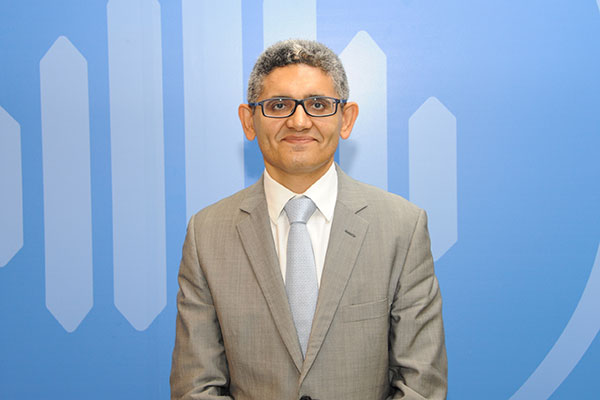
Tawfick ... optimisation is key to staying profitable.
2016 trends for Middle East oil & gas companies
DUBAI, December 20, 2015
Middle Eastern oil and gas companies are implementing flexible and integrated software technology to overcome complexity, aiming to standardise across operations, improve safety and reliability in order to remain profitable, said an industry expert.
The Middle East region is changing with the on-going trend towards the development of mega-refineries and large integrated petrochemical plants that are world-class in both size and complexity, explained Ossama Tawfick, VP Sales, Mena, AspenTech, a leading provider of software and services for the process industries.
Companies are working hard to establish what to produce, how or when to ramp up production, where to sell products, how to distribute it and quickly determine the return on investment. It is a sector in flux where the key players are challenged by the need to navigate uncertainty. To survive in this increasing crowded and fast-changing environment, companies need to be leaner, more efficient and able to adapt quickly to customer needs.
Optimising production
There is a growing pressure for manufacturers to reduce energy use and emissions to increase bottom line profitability. Up to 30 per cent of capital equipment impacts some 90 per cent of energy used in most oil refining and petrochemical processes. Major savings are possible by using appropriate analytical and design software alongside suitable energy-saving technologies. This strategy should form best practice for plants wanting to optimise economic performance through production efficiency utilising recovered energy.
“Also, best in class industry health & safety and environmental regulations are vital to reduce CO2 emissions and a company’s carbon footprint. Excellence in process safety starts by ensuring facilities are designed, operated and maintained in a way that minimises the potential for process safety incidents,” said Tawfick.
“Risk is managed by identifying hazards, assessing consequences and probabilities, as well as evaluating and implementing prevention and mitigation measures. With advanced process control (APC) engineers have the ability to quickly adapt to changing economic situations while decreasing engineering time and effort, improving stability and performance, as well as to meet business objectives faster.
“Essentially, manufacturers can now push the frontiers of operational excellence with greater agility and increase profitability to remain competitive in a highly turbulent market,” he added.
Capital efficiency
With regards to capital expenditure (capex), easily evaluating capital investment projects faster early in design process along with better analysis helps engineers understand economic implications of decisions. Crucially, the project scalability, improved workflow and achieving better predictability and accuracy during FEED reduces the total project life-cycle. With better cost trade-offs in making incremental capital investment decisions companies will become more profitable.
Planning & scheduling
Bridging the gap between strategic planning and scheduling is another essential trend, whereby companies strive for greater consistency and predictability while maintaining inventory and production targets. Therefore, the avoidance of silo practices with integrated software will help empower engineers to be better decision-makers for addressing feedstock planning, operational efficiency, energy optimisation and safety analysis.
Data management
Making sense of vast volumes of production data is the essence of asset optimisation. Advanced MES software dramatically improves data analytics, based on a dashboard that supports faster and better decisions that will be used to elevate production to the highest standards.
With data visualisation software analysis is easier, faster and more effective, allowing operators, process engineers, unit managers and executives to build a complete picture of production performance from continuous to batch. The rich context and analytics tools help drive greater collaboration across the enterprise by enabling benchmarking and sharing of best practices for faster decision-making.
Establishing a centre of operational excellence improves communications and brings operational staff closer together. Those manufacturers that adopt best practices and use the power of data visualisation software tools can better understand the story behind the data and ensure that production outcomes meet with a profitable ending.
Nurturing skills
As an underlying point, the Middle East is focused on addressing a shortage of skilled and experienced indigenous chemical engineers. Many companies are implementing comprehensive training programmes and equipping engineers with intuitive software tools to optimise across all areas of the enterprise.
“aspenONE software suite bridges the skills gap between retiring veterans and younger engineers, equipping staff with powerful integrated, easy-to-use flexible technology with embedded training functionalities,” said Tawfick.
“The software accelerates professional development of junior engineers, whilst maintaining a corporate knowledge base that survives personnel changes and retirements.”
The big prize gained from enabling staff with appropriate tools is that integrated process engineering delivers tangible results, including improving process engineering workflow around 10 per cent; 30 per cent capital and operating cost savings due to inherently better designs; a 10 – 20 per cent improvement in engineering quality and a 10 – 20 per cent improvement in engineering efficiency.
Breakthrough innovations in the latest releases of integrated software allow users to become proficient faster, bringing the power of optimisation to more people in engineering, operations, planning and scheduling across the enterprise.
Being profitable
There will be few certainties in a market that will continue to experience fluctuations and intense competition. However, one thing is certain - to survive in this fast-changing environment, Middle East companies need to be leaner, more efficient and able to adapt quickly to customer needs. Being able to predict outcomes and address operational uncertainties quickly will help companies to protect margins and also seize upon commercial opportunities.
“The need to standardise across operations, improve safety and reliability is vital to be competitive. Therefore, to be exemplary in operating excellence, forward looking companies are implementing flexible and integrated software technology to overcome complexity and accelerate profitability,” Tawfick concluded. – TradeArabia News Service







